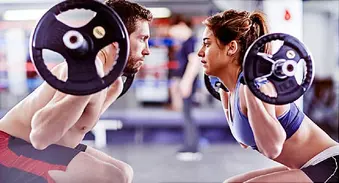Flex Your Muscle IQ


The word “muscle” comes from the Latin “musculus,” which means:
- Little mouse
- Small mass
- Body meat
It’s enough to make your skin crawl. “Mus” means “mouse” in Latin. Word-makers thought some muscles looked like tiny mice moving around under the skin.
What percent of your body weight is muscle?
- 10%-15%
- 30%-45%
- 70%-80%
If you’re a lean man, your body is about 45% muscle, 15% bone, and 15% fat. If you’re a woman, you have around 30% muscle, 12% bone, and 30% fat. The other 25% of your weight comes from your organs.
Which muscle(s) in your body works the hardest?
- Gluteus maximus
- Heart
- Bicep
It may not do any heavy lifting, but your heart is a muscle your body uses constantly. From the minute it forms while you’re in the womb until you die, it beats without stopping, helping move blood through your body.
The human body has about how many muscles?
- 60
- 180
- 600
You need muscles for everything you do, from running and lifting to digesting, breathing, and even getting goosebumps! It’s no wonder you have more than 600 of them to keep your body in working order.
It takes more muscles to frown than to smile.
- True
- False
It’s been a rumor for a long time that frowning uses more muscles than smiling. But scientists tested it and put an end to the myth. You use about 11 muscles to frown, and a 47 to turn it upside down.
Each of your fingers has ___ muscles in it.
- 0
- 3
- 10
Your fingers are like puppets and your hands are the puppeteers. There’s no muscle on your finger bones -- only tendons that hold them to the muscles in your palm and wrist.
Spinach can help give you strong muscles.
- True
- False
Looks like Popeye was really on to something. Spinach is a rich source of iron, which your body needs to carry oxygen through your blood. Without enough of it, your muscles would be too tired to work. Spinach alone won’t make you a champion bodybuilder, but the iron in it is a key player in muscle health.
What is muscle memory?
- When movement jogs your memory
- When inactive muscles quickly regain strength
- Doing easy tasks without thinking
Scientists found that when you build muscle, it forms new structures, called nuclei, which can make more muscle later on. Even when you stop using these muscles, the nuclei stick around. That gives you a head start when you start training again.
You can body-build in your sleep.
- True
- False
A workout will set the tone for strong muscles, but sleep is when you really get pumped up. Your body strengthens and repairs tissues during your deepest sleep cycles. So get your ZZZs -- you need a full night’s rest for optimal muscle mending and growth.
Where is the smallest muscle in your body?
- In your pinky toe
- In your eye
- In your ear
It’s called the stapedius, and it’s in your middle ear. It’s connected to the smallest bone in your body, the stapes. This little muscle keeps the stapes from vibrating too much when loud noises hit your ear -- including the sound of your own voice.
